10 best ManyRequests alternatives and competitors in 2025
Looking for the best Manyrequests alternatives? In this article, we'll go over our favorite tools to help you run your service business in 2025.
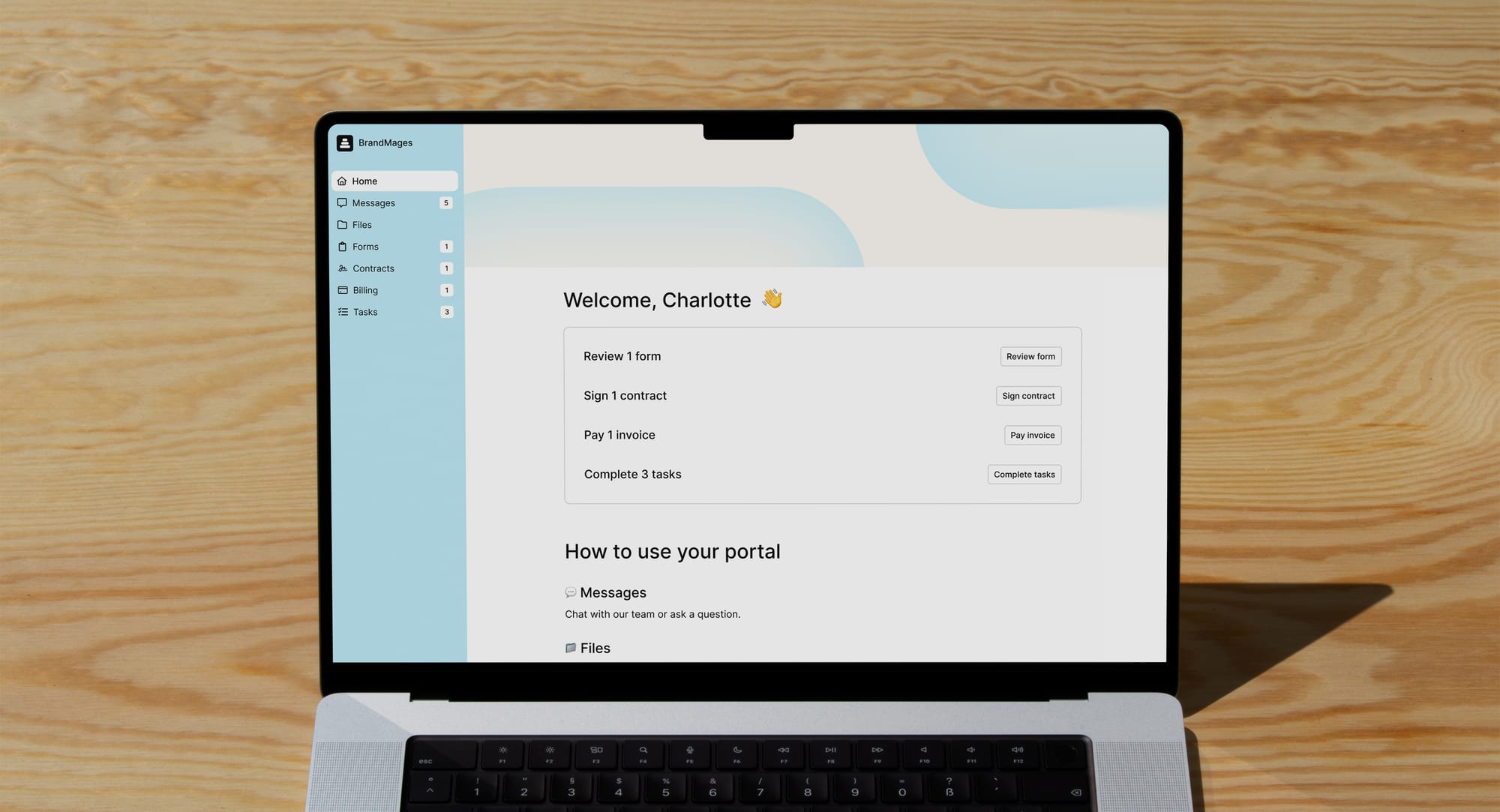
Managing client portals and different workflows is tough. I know this because I’ve personally had a hard time with it while running my own marketing agency.
And if you’re reading this, chances are you’re using Manyrequests and something hasn’t sold you on using the platform for the long run.
Maybe it’s the pricing, maybe it’s the features, or maybe it's just your own personal experience. Whatever the reason, I sat down and tested over 10 Manyrequests alternatives to find out which tools make the most sense for what businesses.
So, in this article, I’m going to walk you through all the different client portal tools that are out there right now (at least, all the good ones). And we’ll talk about what each tool is good at, what their limitations are, and what actual customers have to say about the tool.
By the end of this article, you should be able to decide what platform makes the most sense for you. And to help you with this decision-making process, I’m going to walk you through some things you need to know when evaluating these tools on your own.
What should you look for in a ManyRequests alternative?
When looking for a ManyRequests alternative you need to look at tools based on a few different factors. ManyRequests is a great platform for client portals and workflow automation but not everything is one size fits all.
You want to make sure the platform you choose can support you if you have just one client or if you have 1,000+ clients. Outside of scalability, you also need it to be secure because you are dealing with a lot of sensitive client information. These are the foundations. But you also want it to have a rich feature set that can support your other admin tasks.
Here are the key things to consider when looking for alternatives:
- Customizable client portals: Your alternative should have customizable client portals that match your brand. Look for tools that allow you to create branded experiences for your clients where they can access everything in one place.
- Ease of use: A user-friendly interface is important for both your team and your clients. The platform should be intuitive so you can onboard and train faster and manage day-to-day operations easier.
- Automation features: ManyRequests excels at automating client workflows — so your alternative should do the same. Look for tools that can automate recurring tasks like onboarding, invoicing, and updates to save time and increase efficiency.
- Integration options: Seamless integration with your existing tech stack is a must. Make sure the platform can connect with the tools you already use like payment processors, CRMs, or project management software to create a workflow.
- Scalability: As your business grows so will your operational needs. A good ManyRequests alternative should be scalable with features and pricing plans that grow with your business.
- Pricing and value: Check if the pricing matches your budget and the features you need. Some alternatives may offer more value for the same cost or better pricing for specific features your business uses.
- Customer support: Customer support is key, especially during setup or if issues arise. Look for platforms with support teams that are responsive and offer multiple channels like chat, email, or even dedicated account managers.
With these in mind, we can get a better understanding of what tools out there are actually good and what are just marketing gimmicks.
Okay, no more beating around the bush. Let’s go through our list.
10 best ManyRequests alternatives to check out in 2025
Here are our top picks for the best alternatives to Manyrequests:
Alright, let’s go through each of these.
1. Assembly
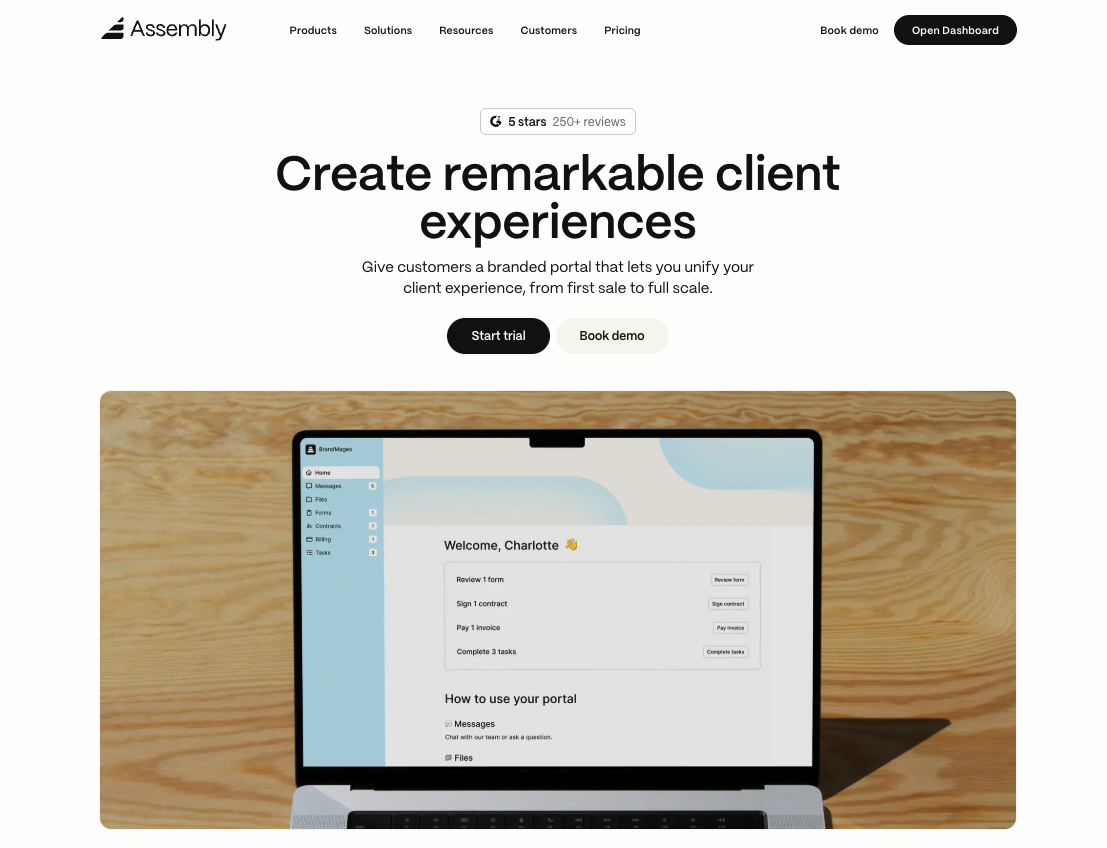
- Best for: Creating custom client experiences for businesses of all sizes
- Pricing: Starts at $39 per month (billed annually)
Assembly is a client experience platform for service-based businesses, agencies, firms and freelancers to streamline their entire business. From automated client onboarding, contract generation, eSignatures, document sharing, task management, invoice generation, and more, Assembly has a set of tools that centralizes your client experiences.
Notable features of Assembly
- Customizable client portals: Create branded portals where clients can access files, messages, invoices, and more in one place.
- Integrated messaging: Communicate with clients directly through the platform, no more email threads.
- Invoicing and payments: Send invoices, manage subscriptions, and accept payments via credit card or ACH, option to pass transaction fees to clients.
- Document sharing: Share and organize files, so clients can access what they need.
- Task management: Assign and track tasks to keep an eye on project progress and keep clients in the loop.
Potential limitations
- As a new platform, some features may be limited for startups that do more than client services, but the team is very responsive to feedback and adding more features.
- No mobile app at the moment.
Assembly is quickly becoming a go-to platform for service providers. On G2, the platform holds a rating of 4.9 out of 5 stars, based on over 189 reviews. This helped Assembly win the “Users Most Likely To Recommend” for the small business award on G2.
If you’re looking for a platform to manage your entire business and help you create stunning client portals, be sure to sign up for a free trial.
2. HoneyBook
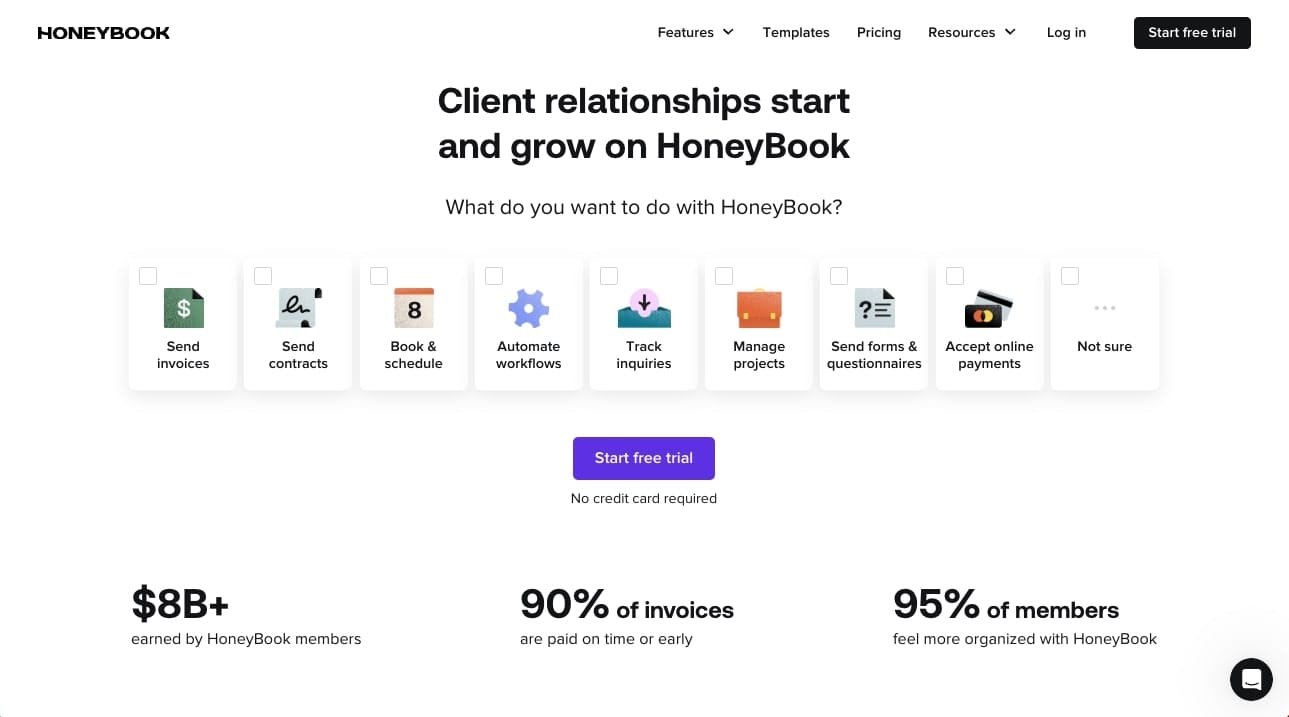
- Best for: Freelancers and small businesses
- Pricing: Starts at $19 per month
HoneyBook is an all-in-one client management platform designed for small businesses and freelancers. It streamlines the client experience from initial inquiry to final payment, integrating tools for project tracking, invoicing, contracts, and scheduling.
Notable features
- Project management: Manage projects with task tracking, client communication, and progress monitoring.
- Invoicing and payments: Create professional invoices and accept payments online with multiple payment options.
- Contracts and proposals: Send proposals and contracts with customizable templates and eSignature.
- Scheduling: Share your availability and schedule meetings with clients, syncs with external calendars to avoid conflicts.
- Automation: Automate workflows, including client follow-ups and payment reminders, to save time.
Potential limitations
- Limited customization: Some users find the platform’s customization options limited, especially when it comes to templates and workflows.
- Geographical restrictions: Currently, HoneyBook is available only in North America, requiring users to have a USD or CAD bank account and SSN.
HoneyBook also has a solid review on G2 — holding a 4.7 out of 5 stars, based on 174 reviews. But, if you’re a business dealing with payments outside of North America, you might want to look into a HoneyBook alternative.
3. Hubflo
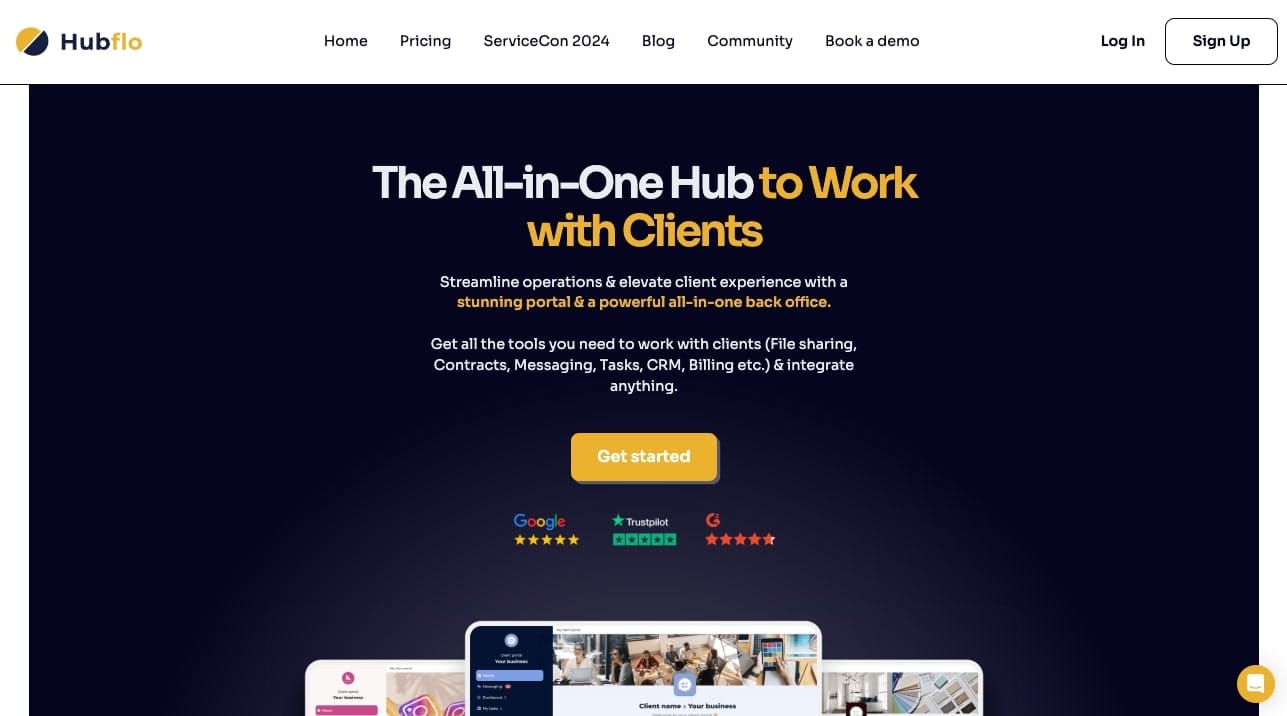
- Best for: Small-to-medium sized firms
- Pricing: Starts at $45 per month/user
Similar to the tools we’ve gone over so far, Hubflo is an all-in-one client management platform for small professional service businesses. It combines client-facing and back-office tools into one system to boost productivity and client engagement.
Let’s go over some of its features.
Notable features
- Custom client portals: Create branded portals where clients can access files, messages, tasks, and project info, all in one place.
- Integrated messaging: Use a secure messaging system with email integration to centralize all client communications and reduce miscommunication.
- Project and task management: Assign tasks, track time, and send project updates to your team and clients.
- Document management: Share files securely, integrate with popular cloud storage services, and use eSignature for contracts and approvals.
- Billing and invoicing: Create invoices, manage billing and payment within the platform, and simplify financials.
Potential limitations
- Feature limitation: Some users have noted that some features are missing but the Hubflo team is active and updates the platform regularly.
- Scheduling: Hubflo doesn’t have native scheduling at the moment, you need to use external tools like Calendly which may not be fully integrated.
Hubflo holds a similar rating to HoneyBook, with 4.7 out of 5 stars based on 19 reviews. Overall, it’s a great tool for small businesses looking to create client portals. However, if the price is a bit too steep for you, it might be worth looking into an alternative.
4. Agency Handy
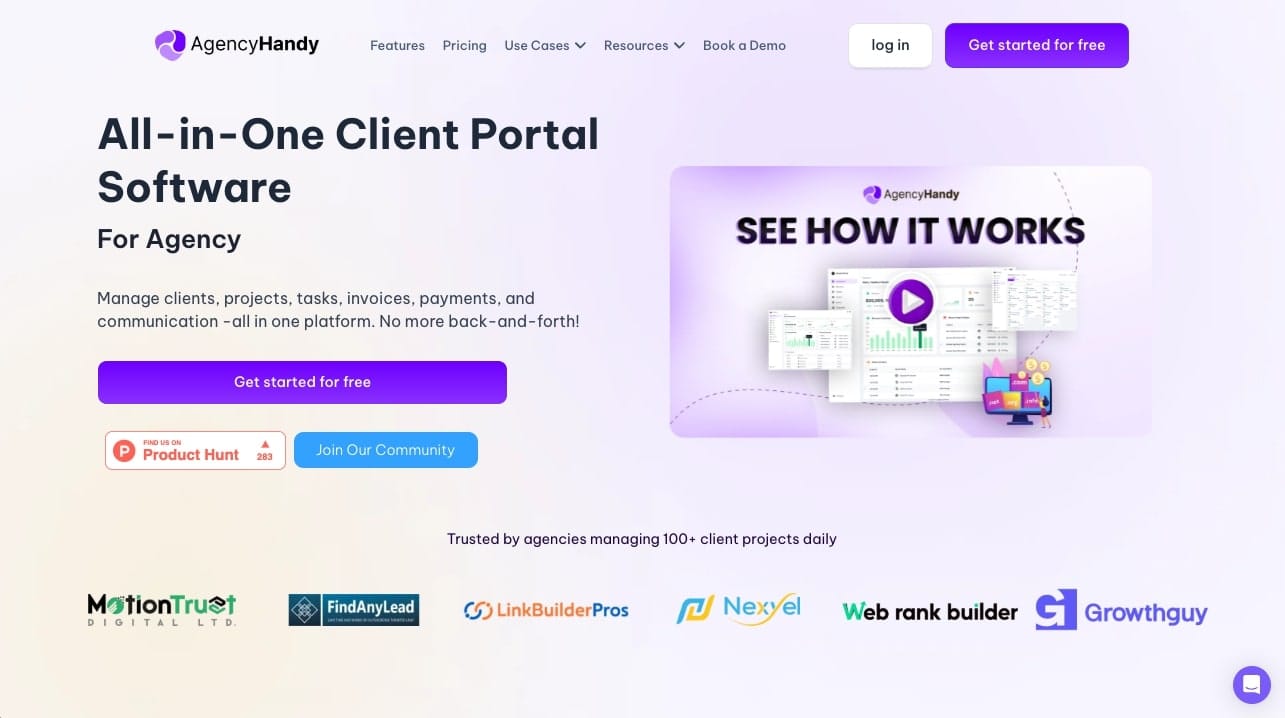
- Best for: Agencies and freelancers
- Pricing: Starts at $69 per month
Similar to Assembly, Agency Handy is an all-in-one client portal solution for agencies and freelancers to manage clients, projects, and communication in one place. It’s one of the tools on this list that serves many of the same features Manyrequest also has.
Notable features
- Service catalogs: Create and showcase your services, including multi-package options, which can be public or embedded on your website.
- Customizable intake and order forms: Design your own forms to capture client information and order processing.
- Integrated billing and invoicing: Create invoices in seconds, with support for multiple payment gateways like PayPal, Stripe, Wise, and manual bank transfer, including split payments and automated subscription management.
- Task and project management: Use Kanban boards to visualize workflows, assign tasks, and track project progress.
Potential limitations
- Some users have noted that some features and automations are missing. Expect future updates to fix this.
- Limited integrations with third-party apps, may affect workflow automation for some users.
At the time of writing this, Agency Handy has a 5-star rating on Capterra (out of just one review). So this goes to show that the platform is still very new. If you do like being an early adopter of new software, this might be a tool to check out.
5. Bonsai

- Best for: Freelance businesses
- Pricing: Starting at $15 per user/month
Bonsai is a tool I bring up a lot. And it’s with good reason. This was the platform I first started my freelancing business with. It’s great for freelancers and even small agencies that are just starting out. It’s an entire management platform that simplifies client and project management from proposals and contracts to invoicing and time tracking.
Notable features
- Proposals and contracts: Create and send proposals and contracts using custom templates with eSignature for client approval.
- Invoicing and payments: Invoices, track payments and expenses within the platform, multiple payment methods for clients.
- Time tracking and task management: Track billable hours and tasks to ensure accurate invoicing and project delivery.
- Client CRM: Store client records, track interactions and manage relationships to increase client engagement and retention.
Potential limitations
- Limited integrations with 3rd party apps may affect workflow automation for some users.
- Some users may find the cost to be on the higher side, especially for smaller businesses or those just starting out.
With a 4.3 out of 5 star rating on G2, Bonsai is an amazing platform for freelancers. You might be a scaling business that wants to create custom client portals that fit your customers’ brand. In that case, it might be worth looking into a Bonsai alternative.
6. Service Provider Pro
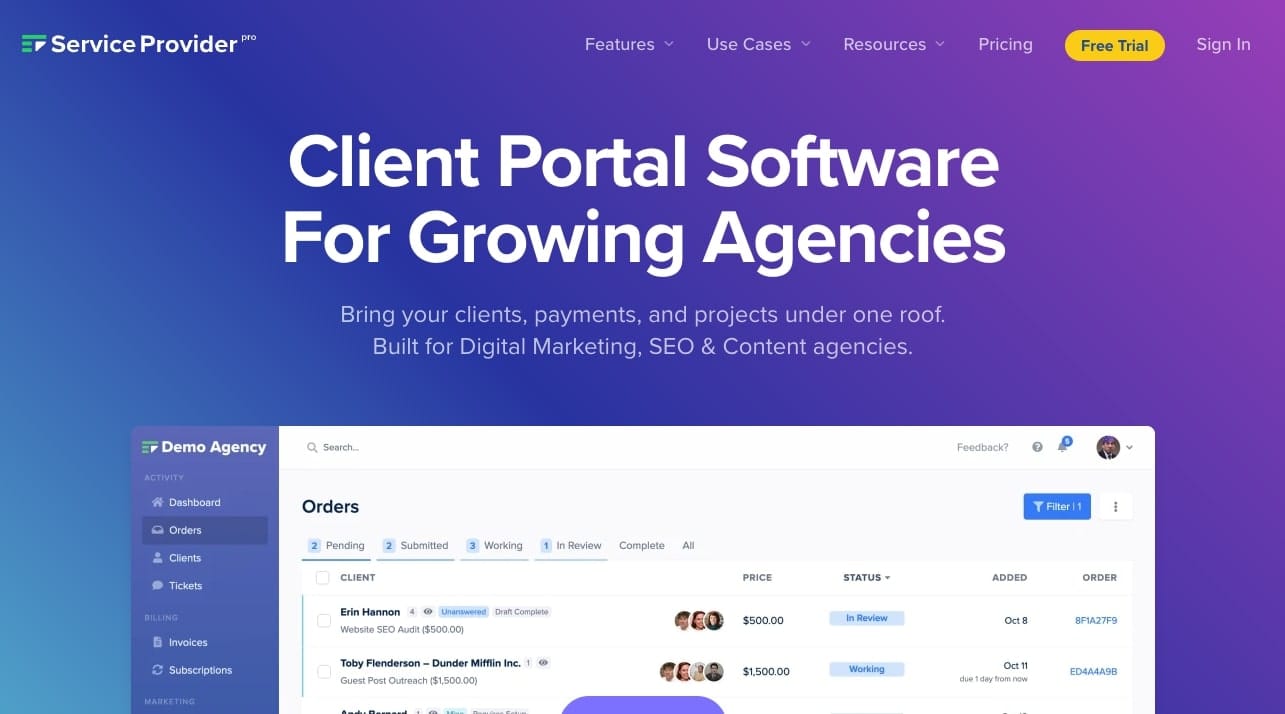
- Best for: For marketing agencies
- Pricing: Starts at $129 per month
Service Provider Pro (SPP) is a full client portal solution for productized marketing agencies. I’ve actually worked with a marketing agency that uses them as a client portal. It combines client management, billing, project tracking, and communication into one place to simplify operations and client interactions.
Notable features
- Customizable order forms: Create order forms with conditional logic so clients can select services, quantities, and add-ons in one go.
- Integrated billing and invoicing: Manage invoices and payments within the platform, supports multiple payment gateways, and has features like shareable payment links and subscription management.
- Client portal: Give clients a branded portal to see project updates, communicate with your team, and manage their services, with more transparency and professionalism.
- Project management: Use dynamic task deadlines, automatic assignees, and repeatable checklists to manage orders and team responsibilities.
Potential limitations
- Learning curve: Some users have said it takes time to learn and use all the features properly.
- Limited Integrations: SPP offers limited integrations with third-party applications, which may affect different workflows for some users.
- Premium pricing: The monthly cost may be a bit out of reach for smaller businesses just starting out.
On G2, SPP holds a solid review of 4.4 out of 5 stars (based on 7 reviews). Many love the tool for its specialization with marketing agencies. It’s a great tool. However, if you aren’t providing marketing services, it might be worth looking at a different tool. This will bring us nicely into our next platform on this list, Moxo.
7. Moxo
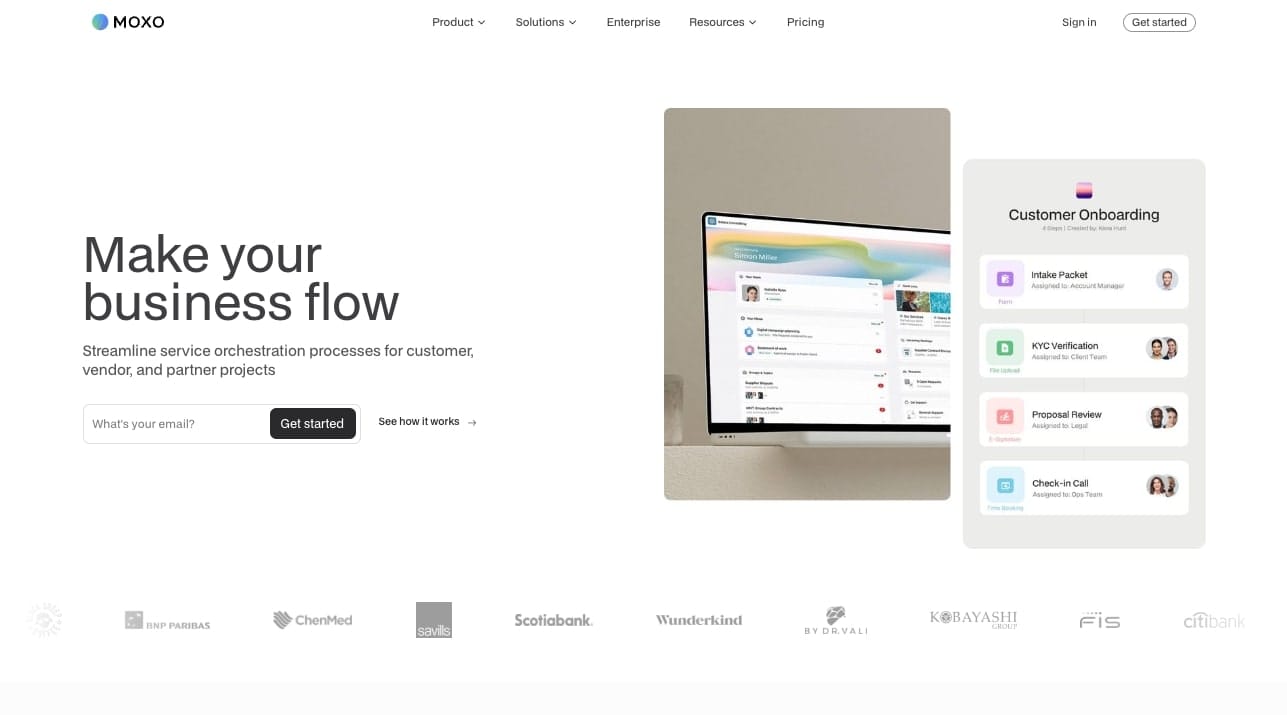
- Best for: Larger enterprises
- Pricing: Contact their sales team for a quote
Moxo is an all-in-one client interaction platform to streamline your business and client engagement. It has various tools to enable smooth communication, document collaboration, and workflow automation for businesses looking to improve their service delivery.
Notable features
- Document collaboration: Share and edit documents in real time with your teams and clients.
- Video conferencing: Hold video meetings within the platform, no external apps are needed.
- Digital signature: Sign documents with built-in eSignature to speed up approvals and agreements.
- Secure messaging: Communicate continuously through encrypted messaging for data privacy and security.
- Workflow automation: Automate repetitive tasks and processes and reduce manual errors.
Potential limitations
- Some users reported occasional bugs like tagging individuals or saving message edits.
- Pricing may be out of reach for freelancers or small businesses.
On G2, Moxo has a solid 4.5 out of 5-star rating (based on 154 reviews). If you’re a larger enterprise, Moxo is a great option to look into. However, if you’re a smaller business it might be worth looking into a Moxo alternative.
8. Zendo
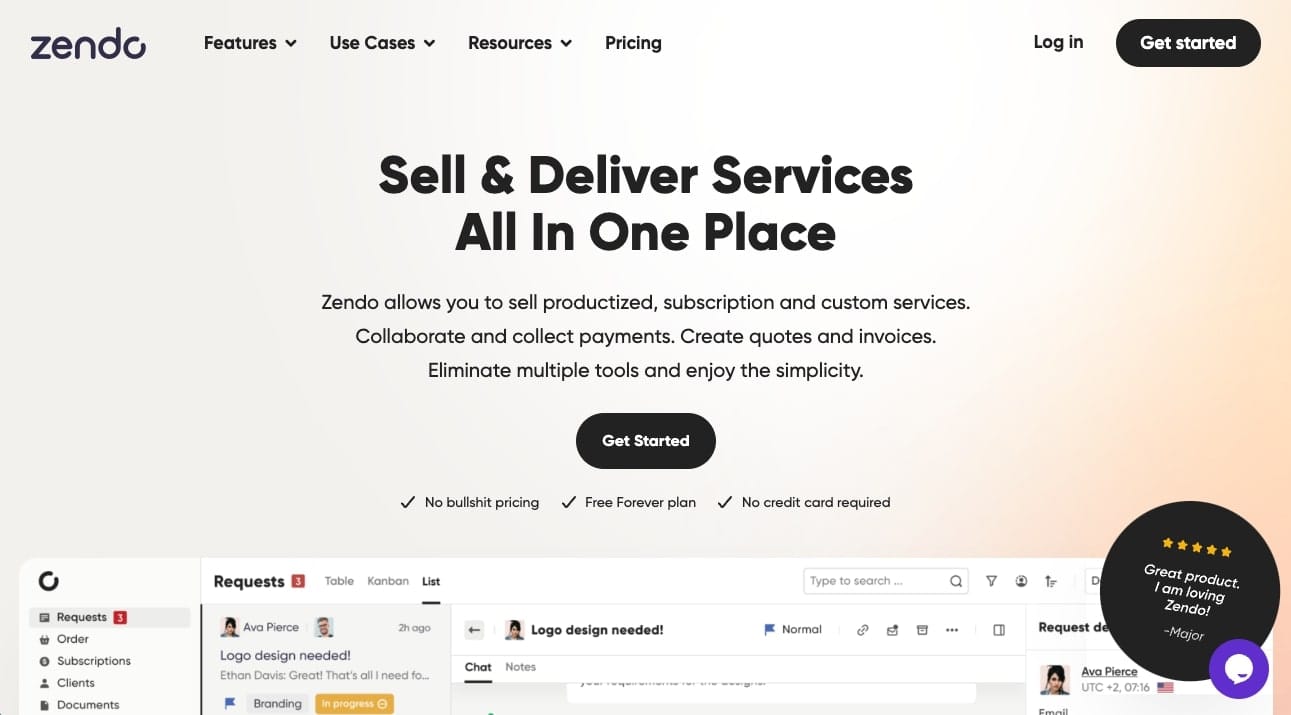
- Best for: Growing agencies
- Pricing: Free, then starts at $49 per month
Zendo is a client portal software that gives service businesses all the tools they need to sell their services. Everything from invoices to client communication, and workflow management is in one platform. It works for web design, marketing, and consulting businesses to increase efficiency and client satisfaction.
Notable features
- Service catalog: Show productized, subscription-based or custom services, clients can browse and buy directly through the platform.
- Order forms: Create custom order forms with unique URLs, collect data, and integrate with your website.
- Quotes and invoicing: Create and send quotes and invoices, with the option to automate the billing process.
- Payment collection: Collect payments via Stripe or bank transfers, clients have flexibility, and financial transactions are streamlined.
- Real-time communication: Use an integrated chat system for real-time client communication, responsiveness, and collaboration.
- Workflow management: Create custom workflows to increase team productivity and consistency of service delivery.
Potential limitations
- Zendo is a new platform, it may not have all the features of more established competitors.
Zendo has a very similar rating to Assembly, with a rock solid 4.9 out of 5-star review on G2 (based on 10 reviews). If you’re a small agency, this can be a great platform to start on.
9. SuiteDash
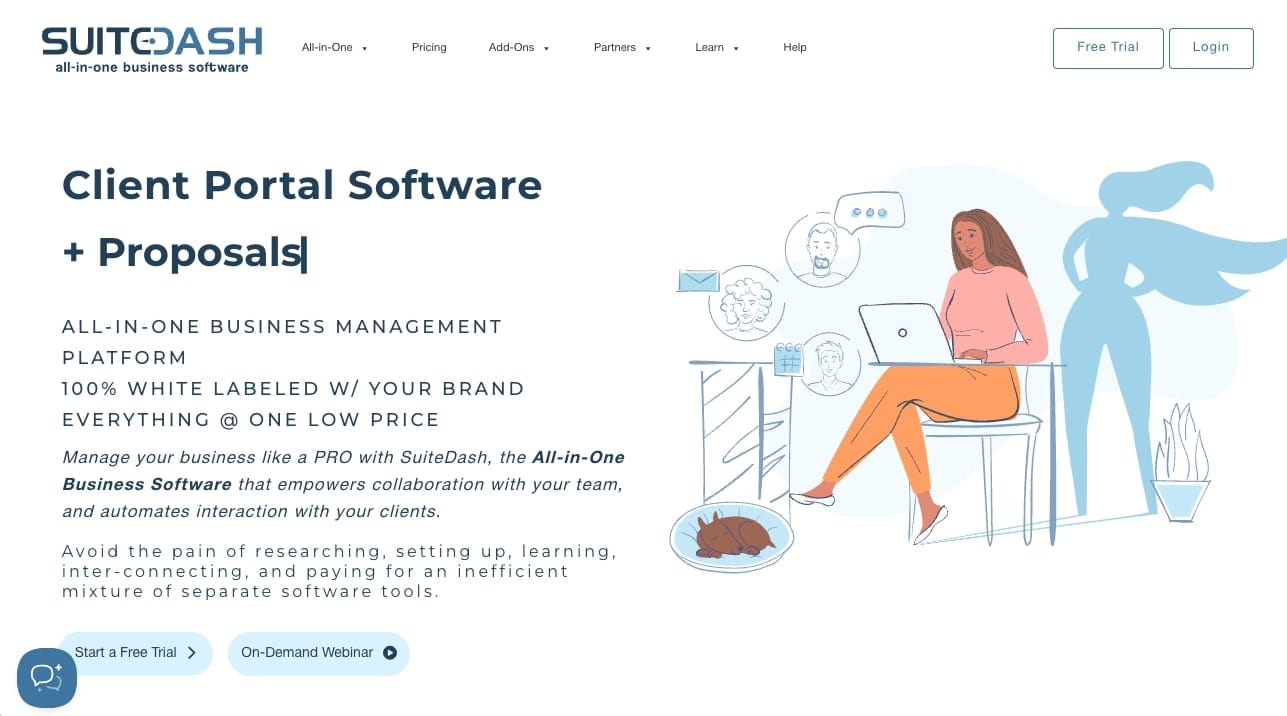
- Best for: Medium-sized businesses
- Pricing: Starts at $19 per month
SuiteDash is an all-in-one business management platform for small to medium-sized businesses. It combines CRM, project management, billing, and client portals into one system to bring all of your client engagement in one unified place.
Notable features
- CRM and client management: Manage client interactions, track leads, and automate sales funnels within a centralized CRM system.
- Project and task management: Organize projects with task assignments, time tracking, and progress monitoring to deliver on time.
- Invoicing and billing: Create invoices, process payments and manage subscriptions with payment gateways like Stripe.
- Client portals: Give clients secure, branded portals to access documents, messages, and project updates.
- Scheduling and appointment booking: Allow clients to book appointments with calendar integrations and automated reminders.
Potential limitations
- Learning curve: Because of the many features, new users may experience a big learning curve during setup and customization.
- Performance issues: Some users have reported slow loading and occasional system glitches, which can hinder productivity.
Regardless of any limitations, SuiteDash is rated pretty highly — with a 4.8 out of 5-star review on G2 (based on 556 reviews). If you’re looking for a traditional client portal tool, this is one to try out.
10. Accelo
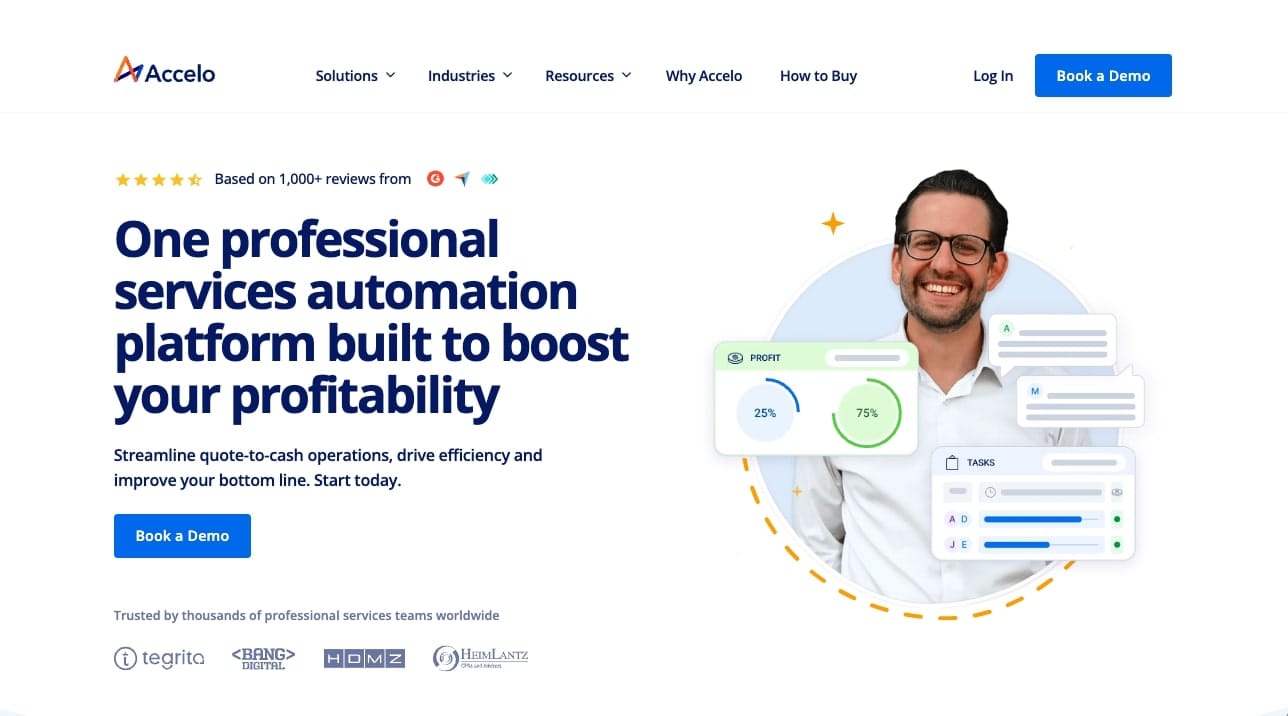
- Best for: IT or engineering consulting firms
- Pricing: Contact sales to get a quote
And last but not least, we have Accelo. Accelo is a comprehensive Professional Services Automation (PSA) platform designed to organize operations for service-based businesses. Similar to most of the tools on our list, it brings together client relationship management, project management, time tracking, and billing tools into one solution.
Notable features
- Client relationship management (CRM): Manage clients, leads, and sales pipelines with tools to track interactions and auto follow-ups.
- Project management: Plan, execute, and monitor projects with tools for task assignments, time tracking, and budgeting.
- Time tracking: Log billable hours easily and get accurate invoicing and team productivity insights.
- Billing and invoicing: Create invoices, manage retainers, process payments, and integrate with accounting software for financial operations.
- Service ticketing: Manage client support requests with a ticketing system that tracks from submission to resolution.
Potential limitations
- Some users find the many features overwhelming, especially for smaller teams with simpler workflows.
- According to reviews on G2, the platform may offer limited customization options, affecting its adaptability to unique business processes.
Speaking of G2, Accelo holds a 4.4 out of 5-star rating (based on 516 reviews). If you’re a consulting firm in the IT or engineering space, this is a great platform to look into.
Software that’s more than just a client portal
Finding the right Manyrequests alternative starts with knowing what your agency or service business needs. As you can see, there are a ton of different great client portal tools out there on the market — and we only keep seeing more of them pop up.
But it’s also important to remember that the tool you use should be a platform for you to not only manage your business, but also scale with it as well. This is why you should look for a client portal that also includes features like intake forms, automated onboarding, integrations with third-party apps your clients may already be using, invoicing, and more.
This is why I personally started using Assembly. Disclaimer: I am not an employee. What made me fall in love with the tool is that it makes my agency feel more like a software company — where my clients can log into their own dashboard on their own time.
If you’re looking to create client experiences that will make your business more memorable, I highly recommend checking out Assembly. And even before you make your free account, I recommend playing around with the demo portal. I’m sure you’ll love it!

